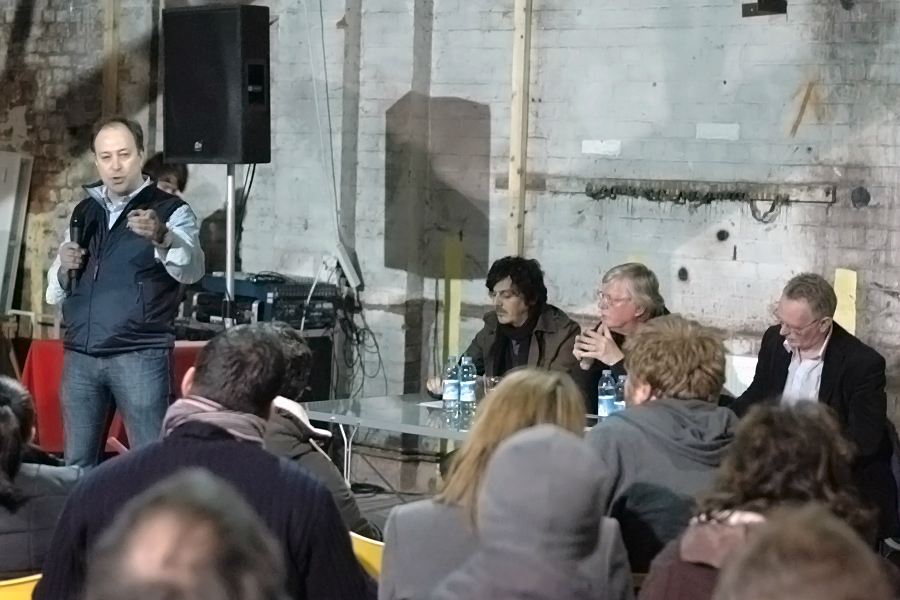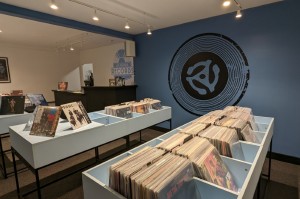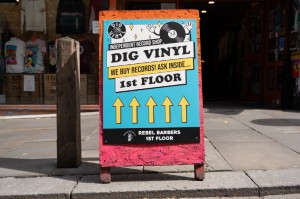Noise Debate at Static Gallery

Jon Davies on inner city rumblings, not all of them emanating from Static Gallery…
It’s no overstatement to say that this was one of the most important events for Liverpool’s music scene for a long time, ironically highlighted by the absence of any music. Since the Beatles, Liverpool has traded on its musical heritage, and following its status as the European Capital of Culture in 2008, it has enjoyed elevated gravitas in the UK. However, on the back end of 2011 into 2012 the city has encountered several well documented blows to the musical landscape, and now, with Static Gallery receiving a noise abatement order, we have the launch pad for this debate.
On the panel was Councillor Steve Munby and Ladytron’s Daniel Hunt, architect Doug Clelland acting as chair. Opening proceedings, Clelland provided a sense of a typical metropolitan city, detailing Paris’ history of noise, and the various ideas proposed to counter it, mostly through town planning. What really hit a chord was Clelland’s observation that silence and death are intertwined human experiences, and an area full of citizens without sound would be the most haunting of all.
Steve Munby was first up to spell out the worries of his residents, taking issue with venues that weren’t like Static Gallery. Munby highlighted the tension between residents and students partying at the beginning of the week, but more importantly the noise emanating from student bars. He did concede that rather than simply slapping abatements on establishments, there should be better channels for residents to voice their opinions to venue owners. The counterargument was headed by Daniel Hunt’s assertion that music and Liverpool’s nightlife brought prosperity to the city and it would be naïve of the council to clampdown on its most prized assets. Rather than blanket terms for any late night space emitting music, live venues should be given special dispensation by residents as gigs aren’t repetitive, regular features of a night out.
Whilst the panel was reserved and gave well thought out arguments, it was inevitable that the floor would form the basis of discussion, views ranging from the succinct and insightful to the slightly ridiculous. Steven Jackson, an acoustics engineer, put forward that the city centre was slowly pushing out that which makes it. The problem was that the council can easily quantify profit made from moving people into the city, but cannot measure culture thus, at least until it becomes too late. Two city centre residents gave their opinion, each calling for respect of residents, those in full time work and those with children, as well as a better understanding between venues and nearby residents in order for the city to thrive. Following this came two of Liverpool’s most prominent music facilitators, Craig Pennington of Bido Lito! and Darren Roper from Liverpool Sound City. They saw the noise abatement order, combined with the closures of venues as harmful not only for the culture of Liverpool but in practical and entrepreneurial terms, with more and more promoters seeking a more welcoming opportunity to put shows on in other cities.
The final invited speaker, Scott Macdonald, asked for ‘good vibrations’; arguing that what should be considered was the kinds of music being played after dark. This view may have also been a piece of advice for the public who were now allowed to have their say, beginning where Hunt and Munby left off, again suggesting lack of dialogue between resident and venue is the problem. The residents came first, pushing for idealistic and perhaps unrealistic solutions. Quality of noise seemed their main concern, pointing the finger not at venues like Static, but the ‘vertical drinking establishments’ filling the streets with constant noise. These complaints came from an older crowd, who were rather inconsiderate. For them it seemed ‘I want to live in the city, but I won’t accept the by-products of city noise’. One particularly riling individual attempted to portray himself as musically elite; rattling off Stravinsky, Cage and Reich and how they would enrich city life much more than the four-to-the-floor we’ve become accustomed to.
On the other side, owner of the Jacaranda Graham Clarke proudly confessed his frequenting of vertical bars, and that they are what makes Liverpool’s nightlife and a large chunk of its economy. But one speaker stood out most for me. Rather unassuming, and seemingly in neither the inner city resident camp, nor the duffle jacketed musicians side, he was honest in saying that the city centre is and should be accommodating for nightlife, and ultimately residents in the city should expect and cope with what Liverpool has on offer, and is somewhat known for. Using the Walton and Anfield areas as examples of noise that cannot be controlled, he argued you don’t necessarily want to listen to 40,000 men roaring for 2 hours several times a week, but residents there accept it as part of their culture, so why not residents in the city?
To conclude, the panel summarised the main points. Steve Munby accusing the musicians of tea-party politics; that they were suggesting that deregulation was the answer, which was the original problem. Munby did however recognise that separate outlines should be given to venues and non-live bars, given that live music was unlikely to be projecting loud volumes constantly until the early hours. Daniel Hunt concluded that shutting down ‘noisy’ venues would affect other aspects of nightlife, including restaurants; a sector Munby highlighted as being free of blame. Hunt agreed that dialogue was necessary for an accord to be reached between residents and venues. The talk was bookended by Clelland’s assertion that the noise abatement order on Static should be revoked, and new solutions to tackle the problem should be considered.
The running theme seemed to be that the problem was a lack of ‘dialogue’. The residents felt that they didn’t have enough power to contact the venues nearby to negotiate volume allowances – a fair point – many places dead in the daytime are rendered difficult to contact once in full swing. The venues and promoters on the other hand felt it inappropriate to have to take into account residents of every neighbouring area. There was one issue the venues were too polite to address, an issue going unidentified, and it’s this:
If you don’t like noise, don’t live in the city centre.
The main complaints were that noise disturbs a good night’s sleep, the city should be family friendly, noise was bad for one’s health, and that residential lettings were vital for inner city economy. However, in a small but dense city like Liverpool a working individual is able to live in the suburbs and commute into town with ease, or dare I say walk in, being only 40 minutes from Lark Lane or the far end of Smithdown road. The city can thrive with less concentrated accommodation in the very centre; it cannot live without that which attracts people to live near it.
Ultimately it felt unfair that of all the places to have noise complaints, it was for Static to hold the debate, as the majority of complaints were directed more towards late license bars. Perhaps it should be for the council to set up new regulations to allow for better competition for more diverse venues, and not think about simply lining their pockets with student money. To imagine a city without noise is not worth imagining.
Jon Davies
Image courtesy Thom Isom





